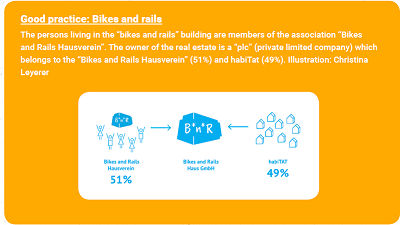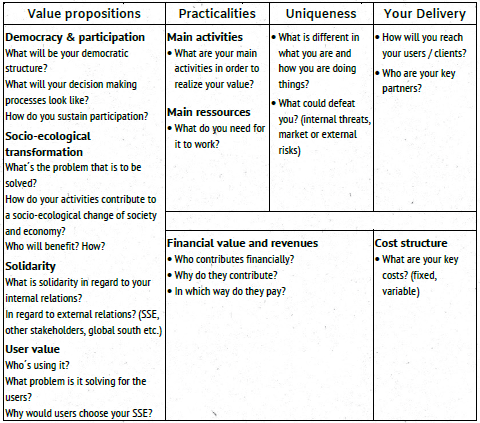In different places, regions, countries and situations the conditions, legal framework or laws, sources and resources can be different and vary in time. Also the forms of the initiatives and situation of the initiators, the group or collective and their (financial) possibilities can be very diverse, as the practical examples illustrate. In some countries, ethical banks can support your efforts, in some cases the co-operative members have savings to support the enterprise in the start-up phase, some governments or municipalities provide support for social enterprises with interest-free loans or even grants. When we run an (SSE) enterprise the question comes up: Who owns the bakery? We are very much used to thinking in capitalist terms, which means thinking in terms of private property, sometimes in terms of communal or also State property. If the crucial conditions of ownership are the right to use and the right to control access, SSE initiatives and enterprises have to think about alternatives to property regimes that exclude persons mainly because of their lack of capital or “buying power”. Since SSE does not offer investment opportunities in terms of maximizing profits, and since many like-minded persons often do not have sufficient financial resources, it is necessary to discover alternative ways of funding. Many of them already exist. So let´s have a look at the following “good practice” which illustrates a remarkable way of doing things differently.
HAITAT (Austria)
HABITAT is an umbrella organization of self-organized “house projects” aimed at “buying out” real estate from the real estate market. The blueprint for HabiTAT was the Mietshäusersyndikat in Germany that now includes more than 150 house projects. The idea is that real estate should not be a speculative good, but rather should aim to serve the needs of the persons living in their homes. Housing should not be treated as ‘for profit’ venture for individuals or companies. HabiTAT and Mietshäusersyndikat provide structures that guarantee that the houses cannot be sold on the open market place – under any circumstances whatsoever (unless if ALL inhabitants of all the other the houses agree to do so). These self-organized “house projects” are based on the solidarity principle: People within a “house project” support one another – plus older “house projects” support new projects. Each group of individuals finds its own way of taking democratic decisions together. None of the persons living in any of the house projects owns private property. Instead everyone´s need for housing is respected. That´s also the reason why living in a house project does not depend on any financial contributions when you move in.
Buthow does alternative funding work? Some of the users of the real estate may have their private funds that they can contribute. These funds plus so-called “direct credits” from other persons

from outside the project are the “basis” for financing the property. Then there is usually funding by an (alternative) bank. The “direct credits” have to be paid back. Sometimes new “direct creditors” are needed if and when people want their money back. However it is not possible to withdraw a major amount of these direct credits at the same time because the “house project” may not be endangered. There are monthly installments to pay back bank loans and direct credits and for maintenance (each user has to pay for this).
